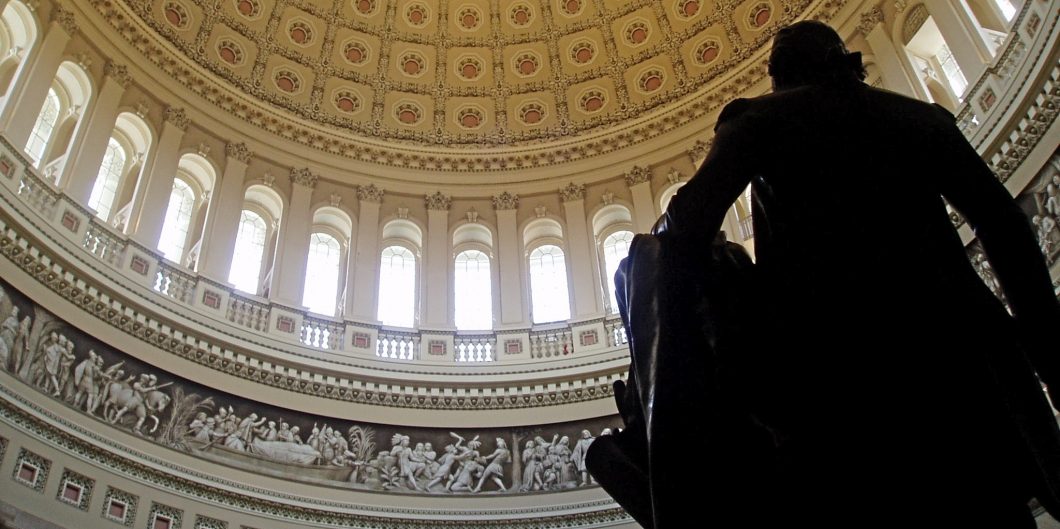An America in Need of a Cato
In the opening scene of Joseph Addison’s 1713 play, Cato, which George Washington had performed at Valley Forge in May 1778, one character pays another a compliment:
Thy steady temper, Portius
Can look on guilt, rebellion, fraud, and Caesar
In the calm lights of mild philosophy.
As we survey the wreckage of the American political scene today, can we find any political figures who deserve a similar commendation? Whose steadiness of character and equanimity of spirit allow them to think clearly about how to move on from the insanity of 2020, rather than drown in its bathos? Is there a political party for the sober-minded?
Naturally, there are a great many people, on both sides of the political spectrum, who think that even asking this question shows a profound incomprehension of the stakes of our political moment. This is no time for temporizing, half-measures, or compromises with the enemy host. Rather, like Cato, the hero of Addison’s tragedy, who struggled against tyranny and finally chose death over captivity, surely this must be the hour to make our stand against those who would debase our political tradition.
Cato, however, established an unassailable reputation as a defender of the Republic and an exemplar of the stoical virtues of self-control before he took to arms. As the historian Sallust put it, Cato “preferred to be, rather than to seem, virtuous; hence, the less he sought fame, the more it pursued him.” It was because he was renowned as an unbending, incorruptible defender of high principles that his struggle against Caesar could be admired even by those who sided against him.
To put things mildly, our highest leaders today aren’t like that. Even when we agree with what they are saying, we must concede that they embody opportunism and self-promotion in a way that we would not like to see in our family or friends. The highest praise that we are able, in good conscience, to offer these shape-shifters is that they have answered the needs of the moment—that they have made themselves into the right person in the right place at the right time. But we cannot look to them to provide examples of the kinds of solidity or republican virtue that we wish to be the foundation of our society.
When I think about what our current politics is lacking, a word that often springs to mind is “ballast.” In piloting a ship or a hot air balloon, ballast is the weight carried to ensure steady navigation. In politics, the people who are described as “salt of the earth” or as “pillars of the community” are the ballast who allow the ship of state to turn steadily and chart its course reliably, even in the face of heavy winds.
Even liberals who, on the whole, want to see America re-invent itself in significant ways may realize the advantages of having some segment of society act as bedrock. The Atlantic’s Yoni Appelbaum, for example, praises the way that “the conservative strands of America’s political heritage—a bias in favor of continuity, a love for traditions and institutions, a healthy skepticism of sharp departures—provide the nation with a requisite ballast.” If one believes there is an enduring and productive tension between respect for the past and a willingness to forge a new future, of the sort exemplified by what Yuval Levin chronicled as “The Great Debate” between Edmund Burke and Thomas Paine, then one will not wish to see the forces embodying tradition simply swept away.
Back in the innocent days of the early 2010s, there was a conceit, most often expressed by moderate Democrats, that Barack Obama was best understood as a kind of moderate Republican thrust into the Democratic fold by the Republican Party’s radicalization in the 21st century. The president himself even endorsed this idea at one point. Of course, as history it is utter nonsense. In his autobiography, Obama documented his youthful political development as a community organizer in the 1980s, and he was no kind of Republican. But the claim was clearly meant in a more symbolic spirit, an encapsulation of the idea that if Republicans could once upon a time have claimed to represent the even-keeled citizens of America, their ideologically-driven desire to overturn decades of state-building meant that they forfeited such a claim in recent years. The conservative governing disposition was becoming the property of the center-left.
True fortitude would steer our leaders away from the ephemera of the daily news cycle and toward the great challenges of our time.
The rise of Trump made it hard to dismiss such claims as mere trolling. Although Trump himself did not set his sights on dismantling the welfare state, and although his administration did not succeed in any sort of radical restructuring of government, his seething contempt for the “deep state” (admittedly sometimes well-deserved and often reciprocated) and his frequent denunciations of everything that came before him make it plausible that the Grand Old Party is no longer a suitable political home for those who place a high value on stability, in their own lives and in their polity.
So are the yin and the yang of our politics now reversed? Are centrist Democrats the keepers of order, the ballast to steady our ship? And are Republicans now committed to a kind of radical insurgency, which, in the name of disrupting an illegitimate cabal of elites, will seek to overturn any institution that might shield the government from their zealous fury?
Not quite. No political party can have a monopoly on steadiness; history offers us many examples of volatile Tories and stolid socialists. And no doubt, at this particular moment, a strong desire for steadiness in the Oval Office has motivated many voters to support a man who sometimes styles himself as a left-center rock who can be relied upon to resist the more volatile elements on both ends of the political spectrum.
Still, given the apparently burning desire of our political left to reject our nation’s political inheritance, economic system, and even basic notions of personal morality, it strains credulity to imagine that somehow our system has reversed polarity and made the Democratic Party the natural home for those who seek steadfastness most of all.
In Addison’s play, Cato declares:
True fortitude is seen in great exploits,
That justice warrants, and that wisdom guides,
All else is towering phrensy and distraction.
That last phrase offers a suitable caption for our politics and our very online culture in 2020. It sometimes seems that anyone sucked into this maelstrom is rendered incapable of deeply focusing on the real problems in the offline world. Realistic policy proposals, the kind one actually sets about building a broad coalition to support, seem to have become passé; earnest devotion to particular institutions, anachronistic. From within the “phrensy” looking out, those who ploddingly insist upon the relevance of old-fashioned values like fiscal conservatism or civility can be summarily dismissed as “Very Serious People.”
But without seriousness, and a sense of the weightiness of things not encompassed in our incessant online “discourse,” it has become difficult for our leaders to even conceptualize the sort of “great exploits” that can elevate the nation. It is not that they try and fail, but that they seem to have no sense of what it would mean for them to show “true fortitude” of the sort that would steer them away from the ephemera of the daily news cycle and toward the great challenges of our time, which are anything but illusory.
Knitting together a cohesive society from material as varied as 21st century Americans is not a problem that can be wished away, but its difficulties must be faced with a sense of realism, rather than the vain hope that they will disappear if half the country will only prostrate themselves before the existence of injustice. Coping with the devastation of a global pandemic requires something more than a talent for deflecting blame; it requires the courage to envision new ways of doing things, and then the perseverance to fight through the bureaucratic obstacles and technical snags that stand in the way.
We may hope that, in parts of our government less amplified by our media, Cato’s virtues are not so absent as they sometimes seem; perhaps Moncef Slaoui, head of Operation Warp Speed—the project spearheading the development of a COVID-19 vaccine—is right now leading an effort that will come to be known as a “great exploit” guided by real wisdom. That you may not have ever heard of him, to this point, is probably to his great credit; after all, following Sallust’s appraisal of Cato, it is those men and women who prefer to be virtuous, rather than merely to seem that way, who we need right now.
Let us hope that some part of our political world can find the counter-cultural resources needed to cultivate such souls.


